This Friday, August 26, we will see a cinematic event that only comes around once in a blue moon: A new film from George Miller. The Oscar-winning Australian helmer best known for the Mad Max, Babe, and Happy Feet franchises has made less than a dozen feature films since his debut in 1979 with Mad Max, and his new picture Three Thousand Years of Longing is his 11th time at bat.
Unlike his currently-lensing 12th film, the Fury Road prequel Furiosa, Three Thousand Years of Longing is a non-franchise project based on the short story The Djinn in the Nightingale’s Eye by A.S. Byatt. With a screenplay adaptation by Miller and his daughter Augusta Gore, the story finds a stagnant academic, played by Tilda Swinton, who inadvertently unleashes a genie from a bottle and must navigate the tricky waters of her requisite three wishes.
MGM provided Vital Thrills the chance to dip into a fun conversation between George Miller, Tilda Swinton, and Idris Elba about the remarkable new film, where they talk about how the two actors heavily contributed to the script as well as the importance of storytelling.

In the film, Dr Alithea Binnie (Swinton) is an academic – content with life and a creature of reason. While in Istanbul attending a conference, she happens to encounter a Djinn (Elba) who offers her three wishes in exchange for his freedom. This presents two problems.
First, she doubts that he is real, and second, because she is a scholar of story and mythology, she knows all the cautionary tales of wishes gone wrong. The Djinn pleads his case by telling her fantastical stories of his past. Eventually, she is beguiled and makes a wish that surprises them both.
George Miller started by discussing the challenges of adapting a story that is both massive and, essentially, a two-hander. “It’s a story set in a hotel room,” said the filmmaker. “It’s a conversation that happens over a relatively short period of time, and yet the content basically is across three thousand years.
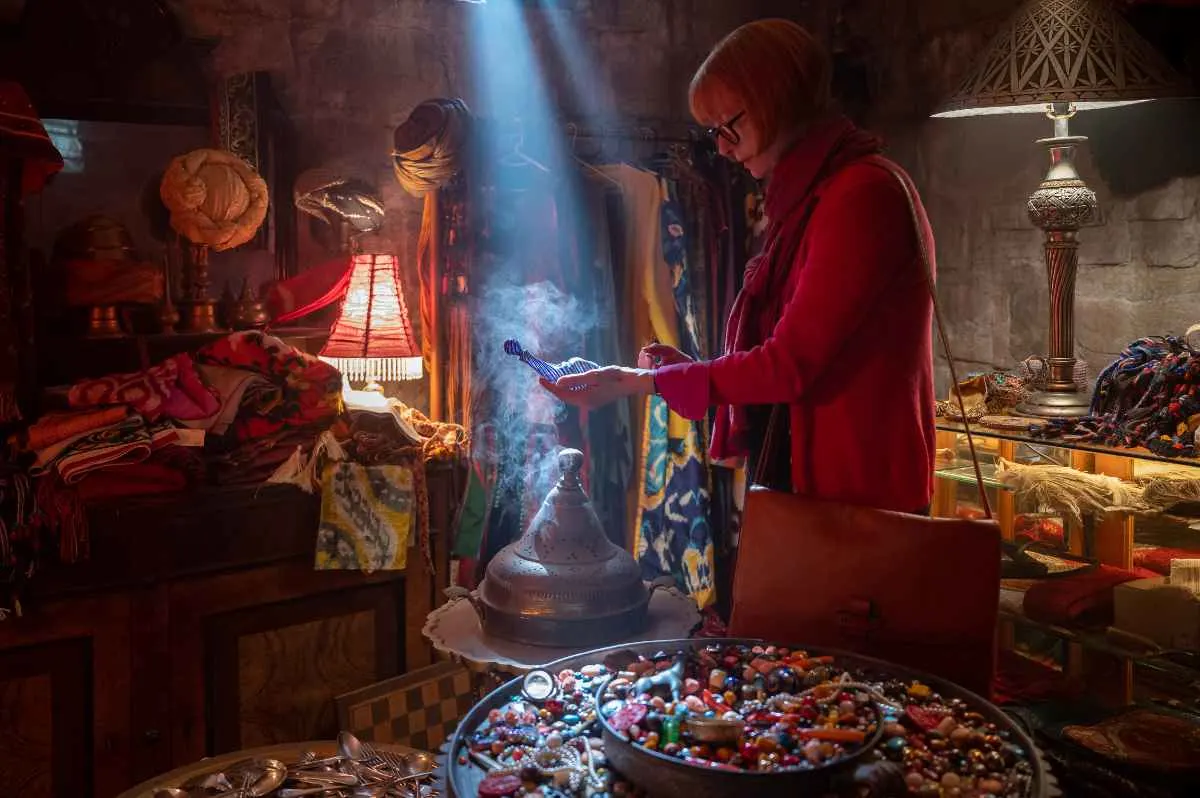
He continued: “It’s a fairy story, and yet it seemed to have a lot of truth in it, which is very, very interesting. Then you have two characters: one is a scholar, a creature of reason, and the other is a creature of emotion and desire. One is mortal, and the other can live indefinitely. Ultimately, it’s about stories and what they do to us, and in particular, love.”
George Miller also discussed how he came around to Idris Elba and Tilda Swinton, his first and only choices for the two leads. “Apart from their skills and talents, is their charisma,” Miller stated. “By charisma, I mean there is that thing, whatever it is in humans and any creature, that we’re intrigued by both the accessibility and the reserve, the mystery.
“Until I actually met them in person, I sort of knew them from the movies and television work that they’d both done, but I had no idea who they were outside of the characters I’d seen them play… The moment I met both, I was struck by how vivid they were as people, their normal personas. Once that happened, I couldn’t think of anybody else.
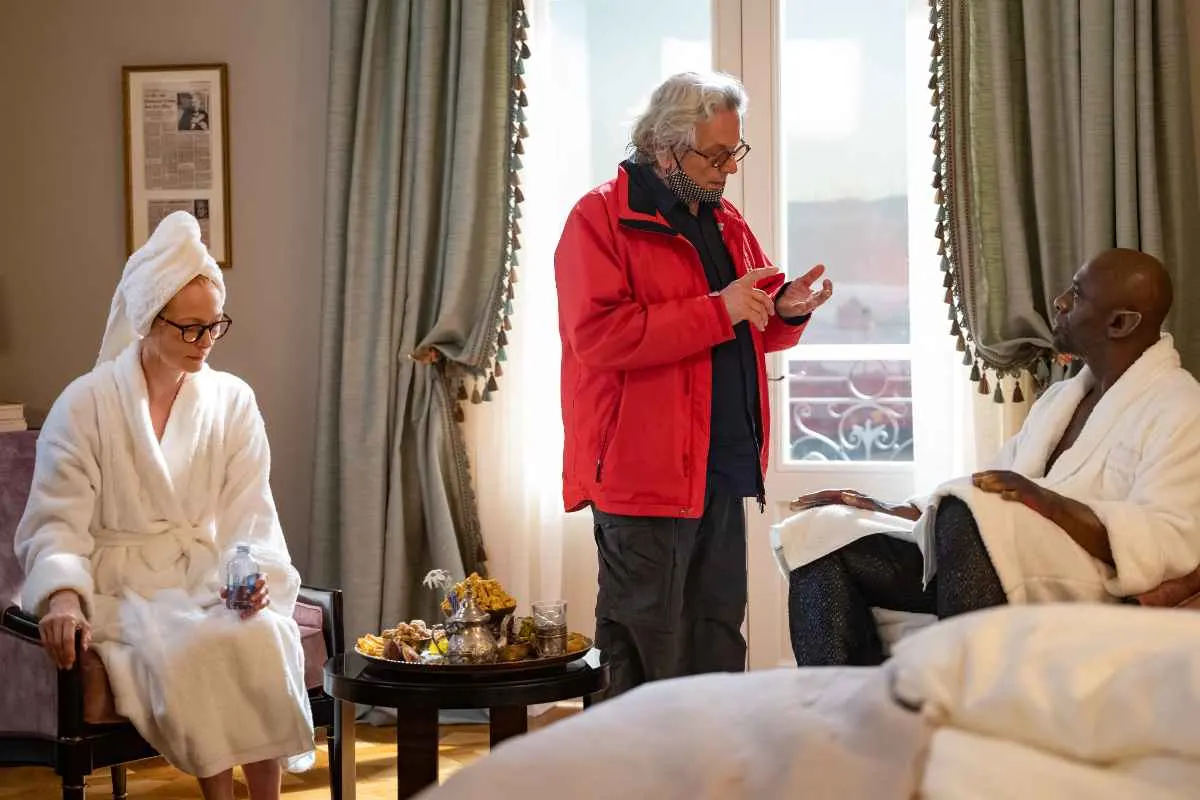
“We were still working on the screenplay. Luckily enough, sometime later, I sent the screenplay to Tilda first, and Tilda was enthusiastic, and then the same was true with Idris. There was no one else for me, and the experience of making the film for me verified that enormously.”
Swinton proved to be as practical as her character, Dr Alithea Binnie, when it came to pinpointing who she was in the grand scheme of the film. “She’s very self-aware,” said Swinton. “When she’s describing herself to the Djinn, she declares very early on at the border, ‘I am someone who finds feeling through stories.’ She is someone who set out her stall for herself in a fairly sort of finite way.
“‘I’m gonna be someone who is not going to feel much on my own account, but I’m gonna find feeling through the stories of other people’s lives.’ She also admits or reveals to the Djinn very early on that she has a predilection to believe non-rational stuff. She might be a rational individual, but she talks about this early relationship with a boy who was her companion, her imaginary friend, someone who really supported her psyche when she was a young person.
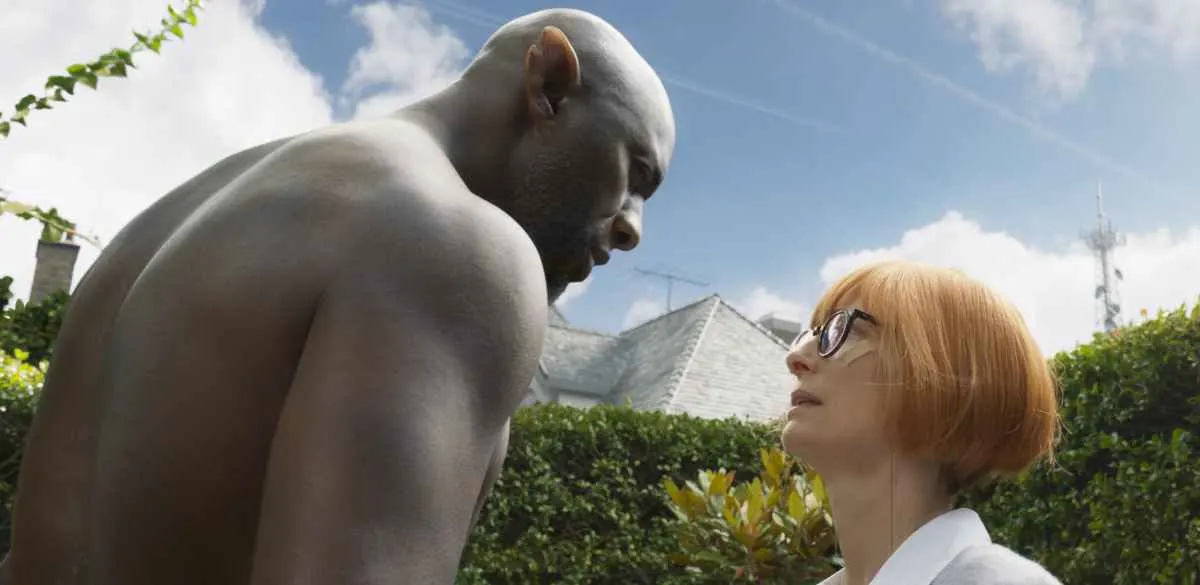
Swinton added: “She’s very aware that she’s given to this sort of curiosity, and I think it’s literally a dream for her to be sitting in this room with this Djinn who’s prepared to tell his stories and provides her some fantastic snacks, and she just sits down and opens her ears and follows. This is an important emblematic part of her nature that she’s truly curious.”
Elba was a bit taken aback by how much creative input both he and Swinton had on Miller’s script, which was already far down the line when they began adding new dimensions to it. “I think that George and Augusta’s version of the Djinn was very much digested, internalized, thought of, and really setting out to be unique in the spectrum of Djinn’s storytelling,” opined Elba.
He added: “That was on the page before I even got there. When we sat around a room for weeks on end, years in fact — two years probably — kicking this around, all of the stuff that George and Augusta had laid down as a foundation and the originality of this character began to spring and grow. My influence, Tilda’s influence, George’s, and our collective influence, started to build the framework of what became the performance.
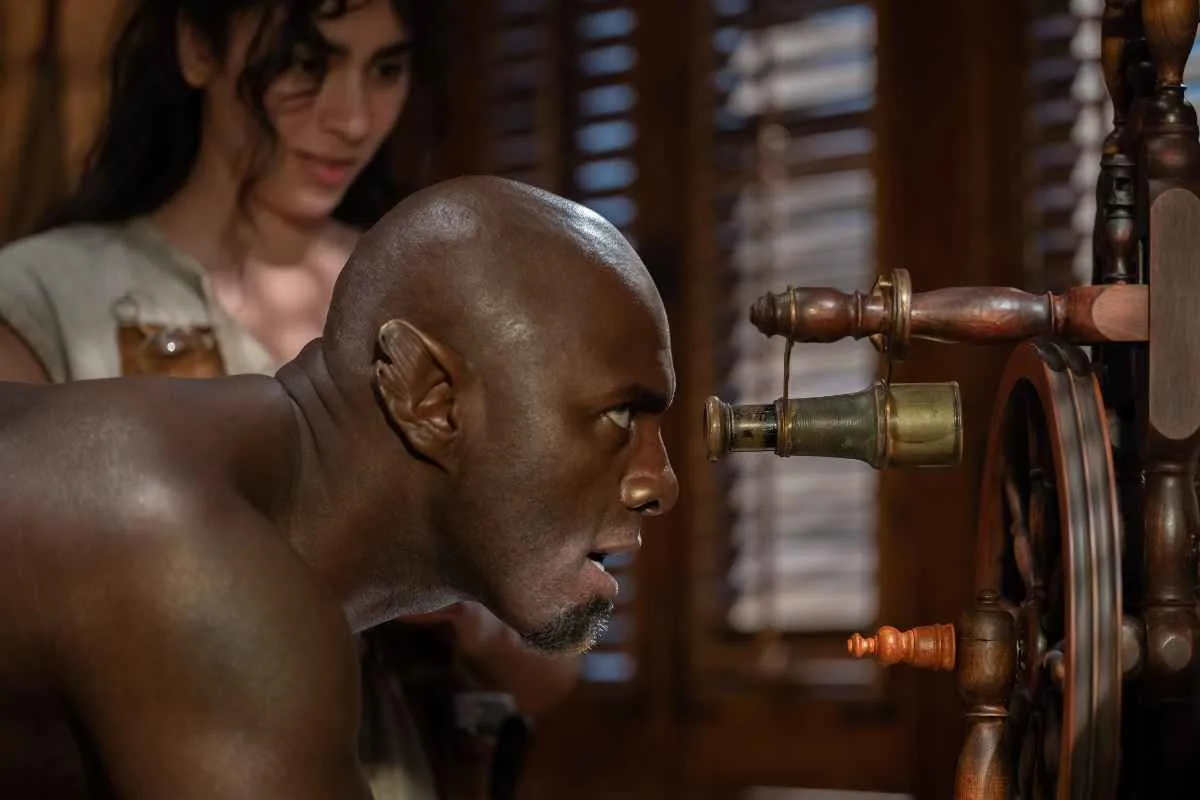
“It was really important to me, actually, to veer away from anything that we may have seen before because I think this character’s journey is only really believable to the audience if we feel like we have never seen anything like this before, isn’t it? The audience is gonna go, ‘Okay, haha, funny story, haha, tell me a joke. Do the wish thing, do the magic thing,’ but I think you are engaged in this character to the point where, quite cleverly, George makes you want to ask, ‘Is he real, or isn’t he real?’
Elba continued: “That’s obviously the device that we end up with at the end of the film. It was really important that we did that work; we nurtured that telling, that version of him. As an actor, it was a gift, just a complete gift, like, ‘Go ahead, there you go, create something.’”
It was also Elba’s bright idea to shoot several millennia’s worth of prior events before he and Swinton shot their scenes in the hotel together. “It was a brilliant idea,” admitted Miller. “It was almost the second thing you said to me. You said, ‘Yes, I’d like to do the movie,’ which, of course, made me really happy. Then you said, ‘Would you mind if we shot all the stories first so that when I’m in the hotel room, I have experienced them to some degree so that I can tell Tilda’s character?’
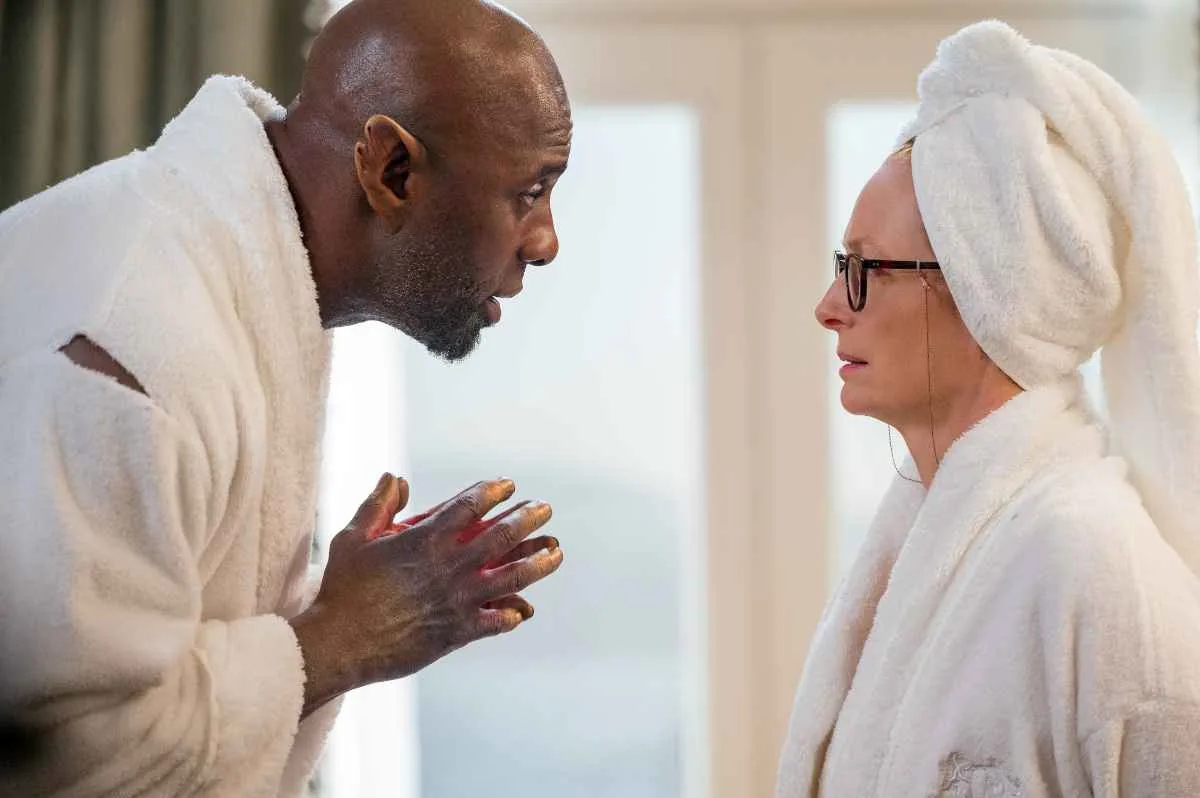
“My first thought was, ‘Damn, why didn’t I think of that myself?’ Secondly, ‘Boy, I’m working with a real filmmaking actor here,’ someone who thinks much more about the film than just his role. So that was a very memorable moment for me… We shot everything during the pandemic, before Christmas break, and then Tilda arrived on the hotel set. By then, we’d cut most of the stories, and so just before we shot the scene, I would show Tilda what Idris was talking about. It was very, very useful.”
Upon committing to the role, Elba also immediately flew out to DJ in Ireland and met with Swinton for the first time in order to cement their bond for the film. George Miller and his leads got even closer once filming began. “We were in quarantine in the same hotel; in fact, we were in adjoining rooms,” Swinton stated. “We had a big Zoom session every single day. I think our record one day was nine hours of cud-chewing. We did a nine-hour session one day. We just talked and talked and talked through every syllable of the script.
“By the time we got onto the set with the camera, we really had seen underneath the surface of the water at the whole iceberg. We really had a sense of confidence about the decisions we’d made, and we felt quite settled. Having said that, we still felt free at the last minute to try fresh things. Even though we’d been making decisions for months and coming to choices, we still felt very open and free to bat it back and forth in different ways through the takes. It was really wonderful, that long, long trajectory of just chewing it.”
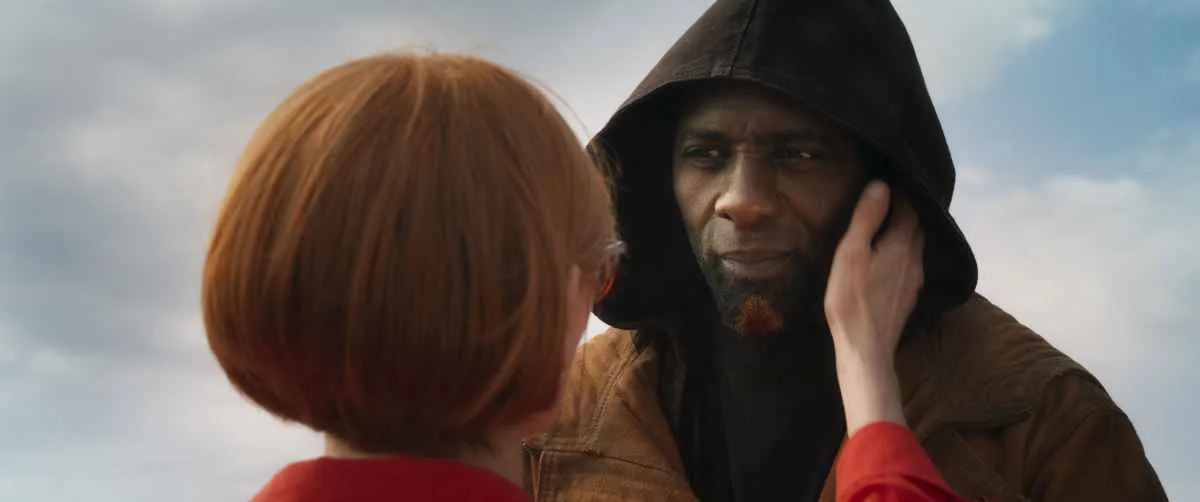
“There’s a lot of vulnerabilities that you share with each other,” added Elba. “I was/am a huge fan of Tilda for a long time before we even met. We’re in a room sitting opposite each other, discussing things about acting, and you kind of go [INHALES], like being in space and taking your first breath without a helmet. You’re like, ‘Whoa, is this actually happening?’ Then, it’s a reciprocal feeling; Tilda feels equally as welcoming, open, and nervous.
“Her offering, as pure as it gets, is like George was when he finally got his actors in the room after writing meticulously each word. Then Tilda will come and say, ‘I think this, and I think this.’ So, all of the vulnerability offers up an experience where you all feel quite safe. As actors, we dread being stale.
“We want it to be fresh a lot. We want it to feel like the first time you’re saying these words. You can only do that when either you’re absolutely improvising, and you don’t know anything you’re about to say, or you know the tech so well that you can say it, whisper it, and someone will go with it.”
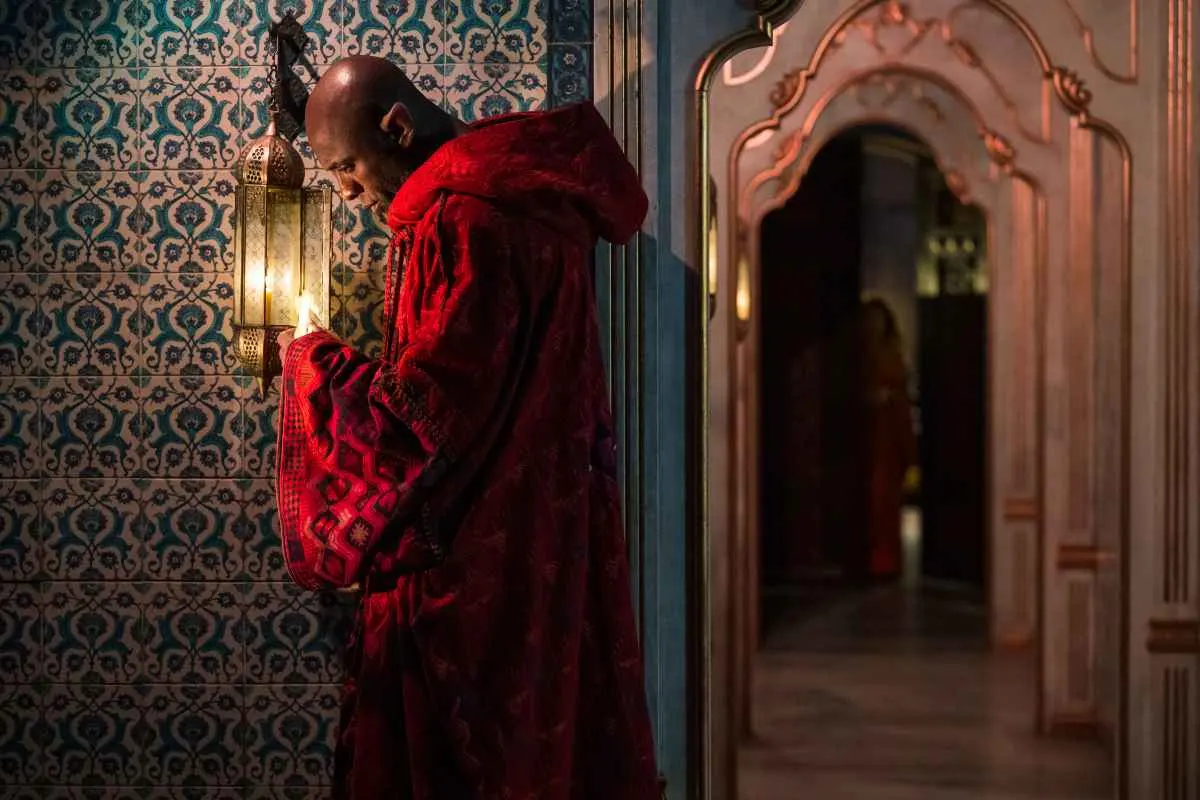
For someone who rarely makes films (and when he does, he does so meticulously), George Miller has shown a profound thoughtfulness as to WHY he tells the stories he tells. “One of the paradoxical things of this story is that it asserts itself as a fairytale,” admits Miller. “But what’s really the benefit of telling these kinds of stories, fairytales, is that you’re working with metaphor and symbolism that can be read by each person who happens to be experiencing this according to their own world view on it and make their own meaning of the thing.
“At the same time they’re sharing meanings with the collective, it’s what we all do in one way. When the story is open to the interpretation of each audience, then they’re invited to experience it. I think that’s why we tell stories, and there’s a long tradition of storytelling about animals. It allows us to extract them and yet take the poetic meaning from them. So that certainly was a big attraction in this story and all stories.
“Even documentaries that somehow stick in my mind are the ones that have that poetic dimension in some way. Even sporting stories or political stories or stories that we think are just normal reporting of events, the ones that stay somehow and become part of this mythology are those that have that kind of allegorical dimensions, either deliberately or unconsciously. That was one of the big gravitational pulls to this story for me.”
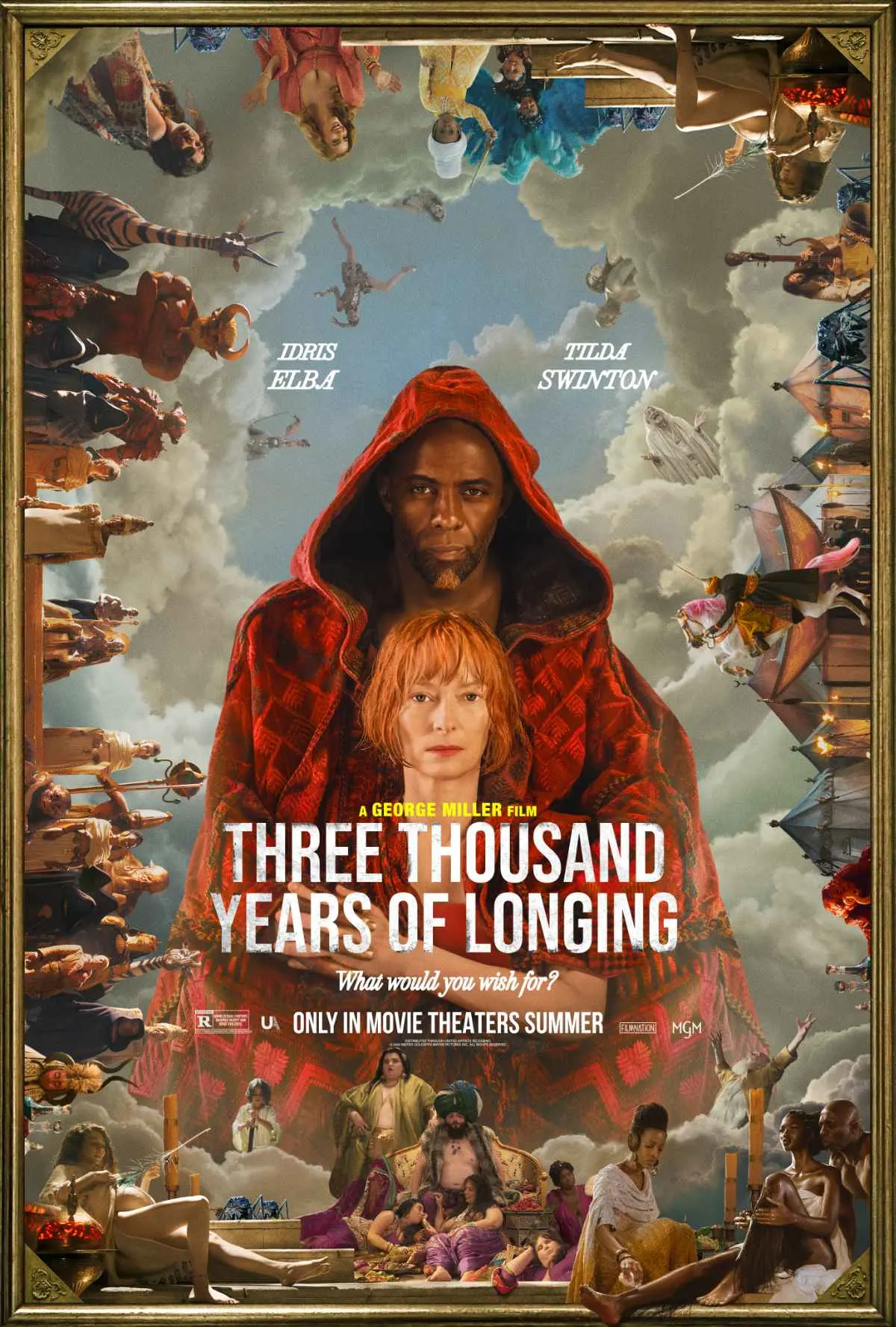
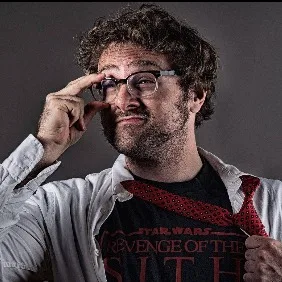
Max Evry has been a film journalist since 2005, serving at various times as a writer, interviewer, graphic designer, podcaster, video creator, features editor, and managing editor. Past media outlets have included MTV, /Film, IGN, and Fangoria. For home video companies Arrow, Kino Lorber, Indicator, and Via Vision, he has provided Blu-ray audio commentaries as well as featurettes for classic and contemporary films, including “Flatliners,” “Blackhat,” and Best Picture Oscar winner “Marty.” In 2023, he released his first book, “A Masterpiece in Disarray: David Lynch’s Dune – An Oral History,” to considerable acclaim.